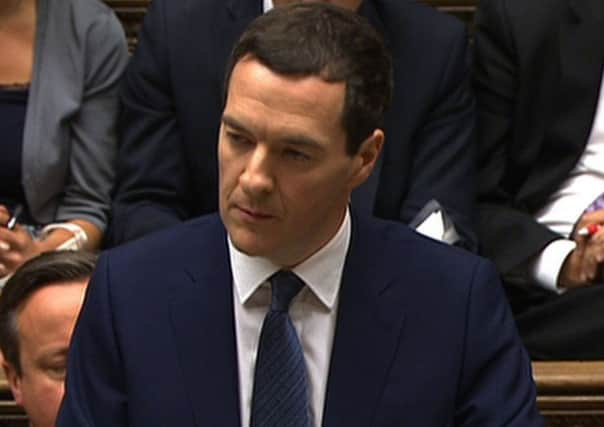Tory Budget takes ‘much more’ from poor than rich


In a damning verdict, the Institute for Fiscal Studies (IFS) also warned that trying to force up wages “was a big gamble”.
The IFS also contradicted the Chancellor’s claim that he was changing the UK from a high-tax to a low-tax economy by pointing out that, overall, he increased taxation by £6.5 billion.
Advertisement
Hide AdAdvertisement
Hide AdIt came as the Chancellor claimed that he was offering the UK “a new social contract” and denied that he had stolen policies from Labour.
But major organisations representing civic Scotland, including the STUC, Shelter Scotland, the Child Poverty Action Group and Citizens Advice, also highlighted “serious, regressive” measures contained in the Budget – which will worsen child poverty, make it harder to escape the poverty trap and implement social security cuts which “have the potential to be just as damaging as the bedroom tax”.
In its assessment the IFS claimed Mr Osborne’s Budget would “hit the people at the bottom hardest” and despite being crammed with “big reforms”, “it was hard to see a theme or economic rationale to them at all”.
In a lengthy dissection of the first Conservative-only Budget for almost 20 years, the IFS claimed it was “regressive”, taking “much more” from the poor than the rich.
The think tank found that, “unequivocally”, low-paid workers will be left worse off by the Budget measures announced by Mr Osborne on Wednesday, despite his introduction of a new “national living wage” of £7.20 an hour, because of his raid on working tax credits for low-paid families.
IFS director Paul Johnson said: “Given the array of benefits, it is not surprising that the changes overall are regressive, taking much more from poorer households than richer ones.”
The IFS was also highly critical of a number of other changes, including a one per cent cap on pay rises for the next four years for public sector workers.
It said the decision would take public sector pay to its lowest level since current measuring began in the early 1990s.
Advertisement
Hide AdAdvertisement
Hide AdThe think tank noted that the effect of protecting defence spending along with schools, education, health and international aid means that unprotected departments, including policing, will be cut by “a third in real terms” by 2020.
Mr Johnson also raised questions about Mr Osborne’s “surprising” decision to cut corporation tax to 18 per cent by 2020, at a time when the UK has the lowest rate in the G20.
The verdict on the Budget came as Mr Osborne denied Labour claims that his package was “pulling the rug” from under thousands of families, insisting it was vital both to continue reducing the “simply unsustainable” welfare bill and to tackle the UK’s “low pay problem”.
Mr Osborne said: “It is a part of saying to our country we have got to have a better contract.
“We can pay this national living wage but we can’t have this welfare system that just grows and grows and grows, crowds out the kind of spending that we should be making on things like education and infrastructure, to provide for the real welfare of the country in the future.
“A family where someone is working full-time at the moment on the current minimum wage is better off and that is the package, that is the deal.”